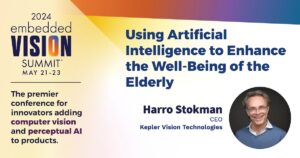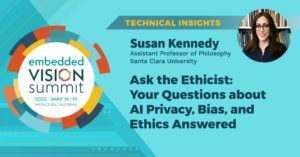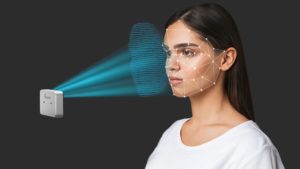Edge AI and Privacy
As sensors and AI proliferate in our devices and our environment, people are understandably concerned about the potential erosion of privacy. For example, there has recently been much discussion in the media about face recognition technology, and some governments have begun to regulate its use.
It may initially seem that the proliferation of sensors and AI must lead to loss of privacy. In reality, it’s possible to design intelligent, perceptive devices in ways that deliver valuable capabilities while protecting privacy. An early example of this is the Netatmo Welcome, a smart home monitoring camera that can be configured to disable video recording when familiar faces are present.
The purpose of this privacy portal is to facilitate awareness of the challenges and opportunities at the intersection of privacy, edge AI and machine perception.
View all Privacy Content

Privacy-first AI: Exploring Federated Learning
This blog post was originally published at Digica’s website. It is reprinted here with the permission of Digica. Over the last year we could witness an unprecedented surge in the research and deployment of new leading-edge machine learning models. Although these have already proven themselves to offer useful applications, the gains usually come at the

“Using AI to Enhance the Well-being of the Elderly,” a Presentation from Kepler Vision Technologies
Harro Stokman, CEO of Kepler Vision Technologies, presents the “Using Artificial Intelligence to Enhance the Well-being of the Elderly” tutorial at the May 2024 Embedded Vision Summit. This presentation provides insights into an innovative application of artificial intelligence and advanced computer vision technologies in the healthcare sector, specifically focused on… “Using AI to Enhance the

“Ask the Ethicist: Your Questions about AI Privacy, Bias and Ethics Answered,” an Interview with Santa Clara University
Susan Kennedy, Assistant Professor of Philosophy at Santa Clara University, talks with Jeff Bier, Founder of the Edge AI and Vision Alliance, for the “Ask the Ethicist: Your Questions about AI Privacy, Bias and Ethics Answered” interview at the May 2022 Embedded Vision Summit. Building ethical AI systems is a tricky business, since examining one’s

“Privacy: A Surmountable Challenge for Computer Vision,” a Presentation from Santa Clara University
Susan Kennedy, Assistant Professor of Philosophy at Santa Clara University, presents the “Privacy: A Surmountable Challenge for Computer Vision” tutorial at the May 2022 Embedded Vision Summit. Ethical concerns about privacy come with the territory of computer vision—after all, it’s hard to deny the privacy implications when considering the digital images or videos that are

“Improving Nursing Care with Privacy-Sensitive Edge Computer Vision,” a Presentation from Kepler Vision Technologies
Harro Stokman, Chief Executive Officer and Founder of Kepler Vision Technologies, presents the “Improving Nursing Care with Privacy-Sensitive Edge Computer Vision” tutorial at the May 2021 Embedded Vision Summit. Around the world, there is a serious and growing shortage of nurses. Nursing care at night is a particular challenge because night shifts are less attractive

Introducing Intel RealSense ID Facial Authentication
What’s New: Today, Intel introduced Intel® RealSense™ ID, an on-device solution that combines an active depth sensor with a specialized neural network designed to deliver secure, accurate and user-aware facial authentication. Intel RealSense ID works with smart locks, access control, point-of-sale, ATMs, kiosks and more. “Intel RealSense ID combines purpose-built hardware and software with a dedicated

What About Privacy?
This blog post was originally published at Ambarella’s website. It is reprinted here with the permission of Ambarella. In an age of universal surveillance, our sensing camera solutions offer a privacy-focused alternative. Security cameras are seemingly everywhere, all around us. They’ve become so ubiquitous that we barely even notice them anymore, monitoring and recording us

Intel Works with University of Pennsylvania in Using Privacy-Preserving AI to Identify Brain Tumors
What’s New: Intel Labs and the Perelman School of Medicine at the University of Pennsylvania (Penn Medicine) are co-developing technology to enable a federation of 29 international healthcare and research institutions led by Penn Medicine to train artificial intelligence (AI) models that identify brain tumors using a privacy-preserving technique called federated learning. Penn Medicine’s work

Hope on the AI Horizon for Data Privacy
This blog post was originally published by Bitfury. It is reprinted here with the permission of Bitfury. Each of us has been giving away our valuable data, for free, for more than 15 years. We do not have any real control of this personal data, nor how it is being processed, or why, or by

Protecting Privacy in a Data-Driven World: Privacy-Preserving Machine Learning
This blog post was originally published at Intel’s website. It is reprinted here with the permission of Intel. Privacy for machine learning (ML) and other data-intensive applications is increasingly threatened by sophisticated methods of re-identifying anonymized data. In addition, while encryption helps preserve privacy while data is stored on hard drives or moving over networks,

